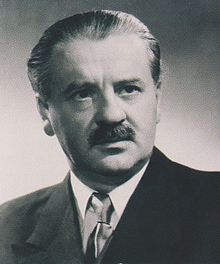Zoltán Tildy
Zoltán Tildy | |
|---|---|
 Zoltán Tildy in 1946 | |
| President of Hungary | |
| In office 1 February 1946 – 3 August 1948 | |
| Prime Minister | Ferenc NagyMátyás Rákosi (acting)Lajos Dinnyés |
| Preceded by | High National Council |
| Succeeded by | Árpád Szakasits |
| Prime Minister of Hungary | |
| In office 15 November 1945 – 1 February 1946 | |
| Monarch | Vacant |
| Head of State | High National Council |
| Preceded by | Béla Miklós |
| Succeeded by | Ferenc Nagy |
| Minister of State | |
| In office 27 October 1956 – 4 November 1956 | |
| Prime Minister | Imre Nagy |
| Member of the High National Council | |
| In office 7 December 1945 – 1 February 1946 | |
| Preceded by | Béla MiklósBéla ZsedényiMátyás Rákosi |
| Succeeded by | Himselfas President of the Republic |
| Personal details | |
| Born | 18 November 1889 Losonc, Nógrád County, Kingdom of Hungary (today Lučenec, Slovakia) |
| Died | 3 August 1961 (aged 71) Budapest, Hungarian People's Republic |
| Political party | Independent Smallholders' Party |
| Spouse | Erzsébet Gyenis |
| Children | Zoltán Tildy, Jr. Erzsébet László |
| Profession | Minister |
Zoltán Tildy (Hungarian: [ˈzoltaːn ˈtildi]; 18 November 1889 – 3 August 1961), was an influential leader of Hungary, who served as prime minister from 1945 to 1946 and president from 1946 until 1948 in the post-war period before the seizure of power by Soviet-backed communists.
Biography
[edit]Early life and family
[edit]Zoltán Tildy was born in Losonc (Lučenec now in Slovakia), in the Austro-Hungarian Empire to the family of a Hungarian official in the local government. He took a degree in theology from the Reformed Theological Academy in Pápa, afterwards spending a year studying at Assembly's College, Belfast, in Ireland. Tildy served as an active minister of the Reformed Church beginning in 1921, and edited the daily paper of the Reformed church in Hungary, the Keresztény Család (Christian Family), as well as other periodicals. In 1929, Tildy joined the Independent Smallholders' Party (FKgP) with other noted Hungarian political figures, including Ferenc Nagy. He became executive vice-president of the organization soon afterwards.
He married Erzsébet Gyenis (1896–1985) in 1916 and had three children: Zoltán Tildy, Jr. (1917–1994), Erzsébet Tildy (1918–2012), and László Tildy (1921–1983).
Political career and later life
[edit]

Tildy was elected to the Hungarian parliament in 1933, being reelected in 1936 and 1939. He put pressure on Horthy's government to pull out of the Second World War. After Hungary was occupied by the Germans, Tildy was forced into hiding. When the Soviets occupied Hungary and drove out the Germans, Tildy became leader of the FKgP and was appointed Prime Minister of Hungary, serving from 15 November 1945 until 1 February 1946, when he was elected President of Hungary. Tildy was an ex officio member of the High National Council from 7 December 1945 until 2 February 1946.
Serving as the first President of the Republic of Hungary when he was forced to resign in July 1948 after allegations emerged about his son-in-law being arrested for corruption and adultery. Tildy was held under house arrest in Budapest until May 1, 1956. He was appointed to the position of a state minister in the coalition government during the 1956 Hungarian Revolution, and was eventually arrested by Soviet forces after the revolution was crushed by Warsaw Pact intervention. On 15 June 1958 Tildy was sentenced by the Supreme Court to six years' imprisonment, in the trial of Imre Nagy and associates. However, he was released under an individual amnesty in April 1959 in view of his advanced years (in fact due to illness). He then lived in complete retirement until he died in Budapest on 3 August 1961.[1]
References
[edit]- ^ Zoltán Tildy, Heads of States and Governments Since 1945, page 364
- Föglein Gizella: Az államfő "intézménye" 1944 és 1949 között
- Haas György: A kisgazda államminiszter
- Sulinet
External links
[edit]- 1889 births
- 1961 deaths
- People from Lučenec
- People from the Kingdom of Hungary
- Hungarians in Slovakia
- Slovak expatriates in Hungary
- Hungarian Calvinist and Reformed clergy
- Independent Smallholders, Agrarian Workers and Civic Party politicians
- Presidents of Hungary
- Prime ministers of Hungary
- Members of the House of Representatives of Hungary (1935–1939)
- Members of the House of Representatives of Hungary (1939–1944)
- Members of the National Assembly of Hungary (1945–1947)
- Heads of government who were later imprisoned
- Burials at Farkasréti Cemetery
